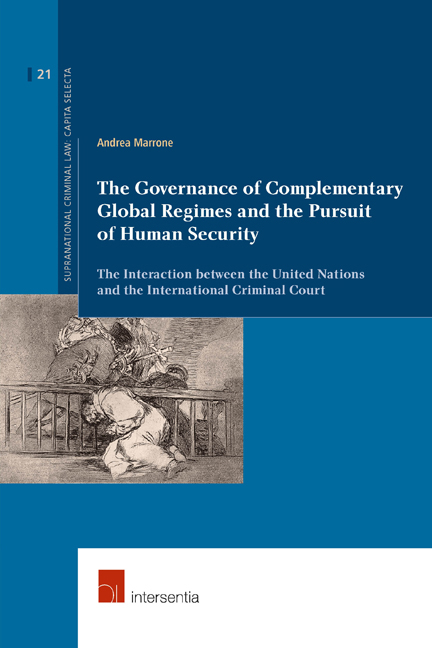 The Governance of Complementary Global Regimes and the Pursuit of Human Security
The Governance of Complementary Global Regimes and the Pursuit of Human Security from INTRODUCTION
Published online by Cambridge University Press: 15 December 2017
PRELIMINARY REMARKS
This study debates the ways complementary global regimes are currently empowered and governed in the field operations, and emphasizes the constant risk of reducing the effect of their respective peace and justice efforts, if appropriate interactions are not settled and political convergence is not finally found. This study argues that the emerging regime of international criminal justice is still missing the support of regional and international organizations, which are important at the same extent of nation-states for the sake of human security. The good governance of such sensitive issues might shorten the links in the preservation of individual rights. The civilian protection measures entail additional competence, which requires further institutional design, including resources and know-how about the victims of war. Besides, the priority should be given to sensitive issues waiting for solution, offering a well-defined place of the Rome Statute regime in global governance systems dealing with individual rights in conflict and post-conflict situations. Both the States and the complementary tools at disposition of the international community need substantial reforms in order to respect, protect and fulfil the right of the victims of human rights violations to an effective civilian protection remedy. In the end, the establishment of an independent international judiciary is only a halfway step to prevent, react and rebuild conflict and post-conflict situations, including the range of crimes deriving from them.
This study is very cautious about the claim that nation-states would have a legal ‘right’ to intervene with military operations under the ‘flag’ of civilian protection duties. After all, the use of force is essentially prohibited under international law and this is not the only tool to stop mass atrocity crimes. But how does the emerging regime of international criminal justice falling under the Rome Statute, currently receive a place in the arrays of peace and security maintenance? How are violent internal political transitions governed at global scale? Is the international society more human, more secure, and more peaceful with the complementary tools currently at disposition? And which is its current ability to take care of serious breaches of human rights? This work approaches the distinction between the concepts of legality and power in the absence of checks and balances systems monitoring the ‘right’ of humanitarian intervention, and the paradigm shift of civilian protection duties.
To save this book to your Kindle, first ensure no-reply@cambridge.org is added to your Approved Personal Document E-mail List under your Personal Document Settings on the Manage Your Content and Devices page of your Amazon account. Then enter the ‘name’ part of your Kindle email address below. Find out more about saving to your Kindle.
Note you can select to save to either the @free.kindle.com or @kindle.com variations. ‘@free.kindle.com’ emails are free but can only be saved to your device when it is connected to wi-fi. ‘@kindle.com’ emails can be delivered even when you are not connected to wi-fi, but note that service fees apply.
Find out more about the Kindle Personal Document Service.
To save content items to your account, please confirm that you agree to abide by our usage policies. If this is the first time you use this feature, you will be asked to authorise Cambridge Core to connect with your account. Find out more about saving content to Dropbox.
To save content items to your account, please confirm that you agree to abide by our usage policies. If this is the first time you use this feature, you will be asked to authorise Cambridge Core to connect with your account. Find out more about saving content to Google Drive.